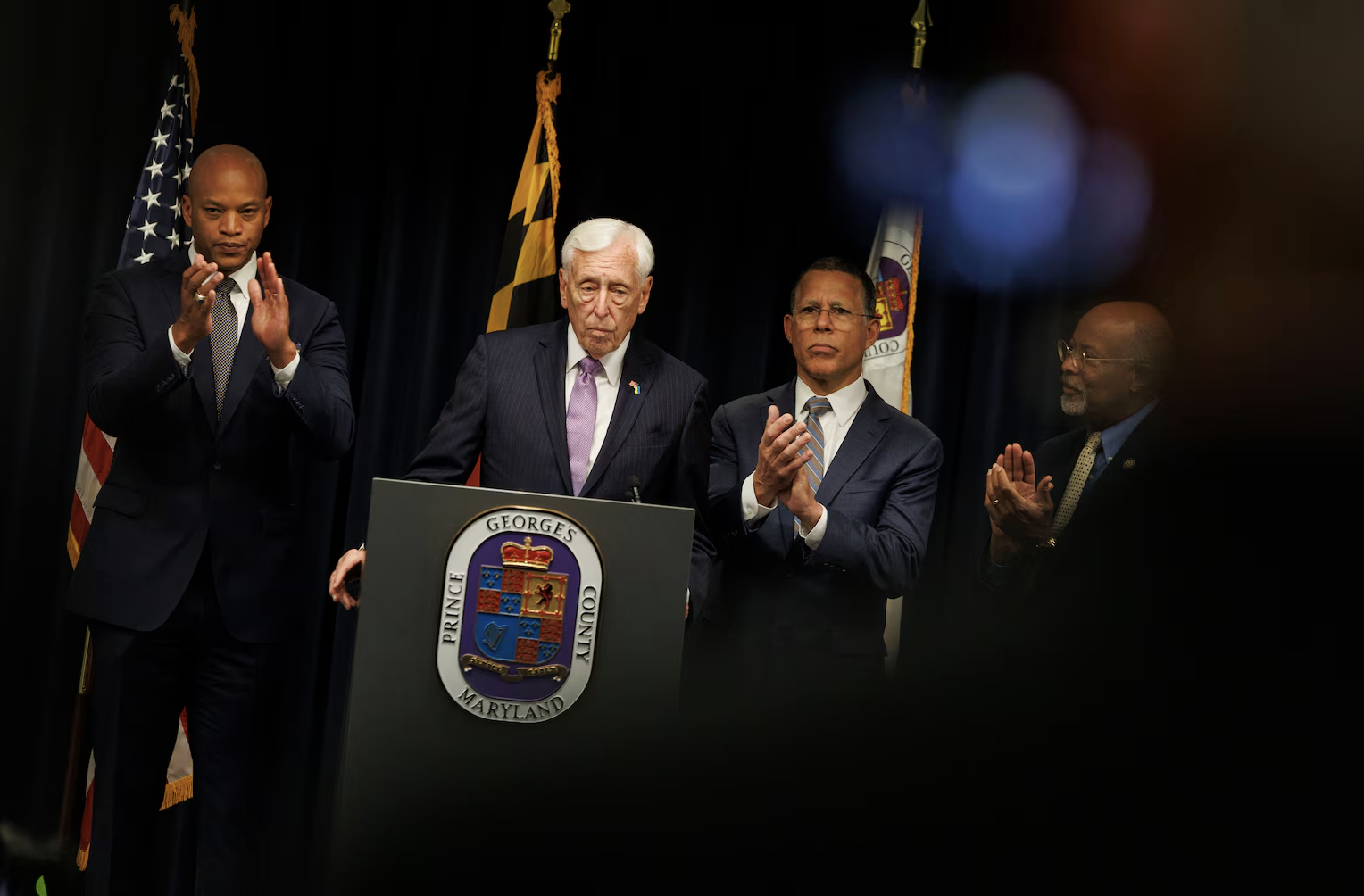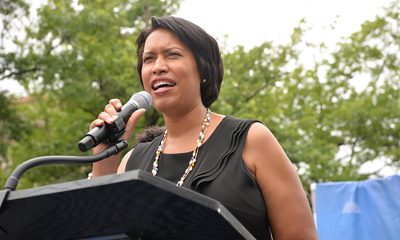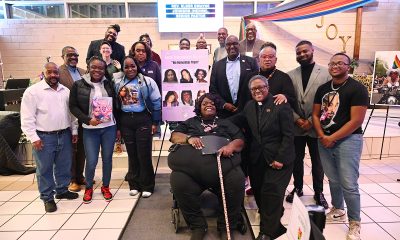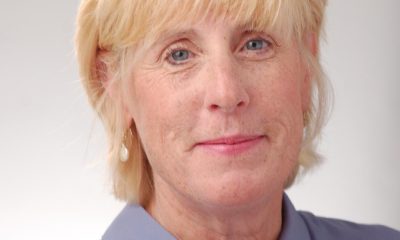Local
D.C. has marriage, so now what?
Despite successes, activists say ‘we have not overcome yet’

Aisha Mills, president of the Campaign for All D.C. Families, said LGBT activists cannot ‘rest on our laurels’ despite recent successes. (Washington Blade photo by Michael Key)
When the weddings for same-sex couples began in the District of Columbia on March 9, many in the community hailed the occasion as the capstone of the city’s decades-old LGBT rights movement.
The District government’s enactment of a same-sex marriage law in December and Congress’s decision not to stop it follows a long list of existing city laws and policies that protect LGBT people from discrimination, some of which were approved more than 30 years ago.
With this as a backdrop, some in the community wondered whether the same-sex marriage law marked the completion of the LGBT rights movement within the city, enabling activists to move on to other causes and endeavors.
But an informal Washington Blade survey of local LGBT activists conducted over the past two weeks shows that virtually all those contacted believe a wide range of LGBT-related problems and concerns remain on the agenda of local advocacy groups.
“There’s still so much work to be done,” said veteran D.C. gay and Ward 8 community activist Phil Pannell. “We have not overcome yet.”
Pannell and others involved with local LGBT organizations pointed to alarmingly high rates of HIV infection among D.C. men who have sex with men, the city’s unwelcome status of having the nation’s highest rate of reported anti-LGBT hate crimes, and its distinction of being one of the few major U.S. cities that fails to provide ongoing city funds for its LGBT community center.
The same contingent of activists expressed caution that the fight for same-sex marriage in the city is not yet over. They noted that a lawsuit seeking to force the city to hold a voter initiative calling for repealing the law is scheduled to come up for a hearing May 4 before the D.C. Court of Appeals.
City attorneys, who have already won several earlier court challenges to the marriage law, say they are optimistic the city will ultimately win its case in defending a provision of its initiative and referendum law that bans ballot measures seeking to take away rights from minority groups.
That law, which gay activists persuaded the City Council to pass in the late 1970s, has so far spared the city a divisive ballot fight over gay marriage that has rocked other states, including California and Maine.
“We still have to stay vigilant and make sure we are actively monitoring what will come down through the courts,” said Aisha Mills, president of the Campaign for All D.C. Families, one of the lead groups that lobbied for the city’s same-sex marriage law.
“And we also know that Congress still has an opportunity to get involved and intervene in D.C. in a number of ways,” she said, pointing to Congress’s authority to overturn a D.C. law at any time, including through its process of approving the city’s annual appropriations bill.
“We are not going to be able to rest on our laurels and be safe and secure in having marriage at least, I would say, for another year or two or even longer,” she said.
Veteran D.C. gay activist Bob Summersgill, who is credited with mapping the strategy for passing a same-sex marriage law, said he, too, is hopeful that a ballot measure seeking to repeal the law will be defeated in court. However, he noted that Congress could always exert its authority to force the city to put the issue before the voters.
“The Democrats will not hold both houses [of Congress] forever, and it is unlikely that any Republicans will back marriage equality in D.C. if they gain a majority,” Summersgill said. “The longer that they are put off, the safer we are, but we must be prepared to fight a ballot initiative.”
On other matters, Summersgill and Rick Rosendall, vice president of the Gay & Lesbian Activists Alliance, point to GLAA’s 21-page 2008 LGBT Agenda, or policy paper for D.C., which describes a wide range of issues that the group believes are related to gay, lesbian, bisexual and transgender city residents.
Rosendall said the group is updating the Agenda document in time to present it to candidates running in this year’s mayoral and City Council races.
“Marriage equality is only part of one of six sections in our policy paper,” Rosendall said.
In addition to addressing LGBT families, Rosendall said the document lists LGBT-related concerns over public safety, including the Police and Fire and Emergency Medical Services Departments and the Department of Corrections; public health, including AIDS; human and civil rights; education and youth; and consumer and business issues.
“Even if we achieve equality on paper — and we have a long way to go in some of these areas — continued vigilance is required to ensure that good policies are put into practice,” he said.
Among the specific issues addressed in the document are bullying of LGBT youth in the city’s public schools “while adult authority figures often look the other way,” lack of social services for transgender residents, and a local health care system that doesn’t sufficiently serve lesbians.
The GLAA Agenda document is available online at the organization’s web site, glaa.org.
Lesbian Democratic activist Barbara Helmick cited a litany of issues similar to those raised in the GLLA Agenda document, but said that local activists should go a step further by joining others in the community to push for changes in federal law.
Of particular concern to same-sex married couples, she said, is the existing federal law barring them from obtaining Social Security spousal benefits given to straight married couples.
“I think with our unique seat right here with the federal government down the street, the local community becoming active in that campaign would have enormous benefits for many of our married couples here in the city as well as married couples throughout the country,” she said.
David Mariner, executive director of the D.C. LGBT Community Center, said many of the LGBT-related social services programs that groups like GLAA seek to improve are performed in other cities by LGBT community centers.
Pointing to a call by activists in Philadelphia for “brick and mortar” projects and programs for LGBT youth, seniors and other vulnerable populations, Mariner said the D.C. LGBT Center has the ability to house or operate such programs if the city helps fund the center.
“We are the only major U.S. city that doesn’t have a permanent building for our local LGBT Community Center,” Mariner said. “In our short time at 1810 14th St., N.W., we’ve seen what is possible when we have an appropriate facility. Unfortunately, we will have to leave this facility, possibly as soon as this summer, and our future is uncertain.”
Mariner was referring to a lease the Center has for a building formerly used by the Whitman-Walker Clinic. The building is owned by a real estate development company that plans to demolish it to build a new condominium and office complex. The Washington Blade offices also are located in the building.
Brian Watson, director of programs for the non-profit social services group Transgender Health Empowerment, and longtime transgender activist Earline Budd, an outreach worker for the group, both said the community’s work in addressing transgender issues is far from complete.
The two pointed to the organization’s Wanda Alston House for LGBT youth, which provides temporary housing and social services to gay and trans youth. Due to city budget cuts, the Alston House lost a sizable portion of its city funding, requiring THE to reduce services to the youth staying at the house.
“Homelessness in our community is mostly invisible,” Budd said. “One of my priorities for our movement is to find out how we can reach the social and economically disadvantaged in our community.”
Gay Democratic activist Peter Rosenstein said an important part of the community’s continuing agenda should be making sure the mayor and city agencies properly implement LGBT-related laws and policies already on the books. He noted that agencies such as the public school system haven’t been aggressive enough in carrying out anti-bullying polices, for example.
“We may also need to legislate action” requiring the agencies to better carry out such programs, he said.
Carlene Cheatam, a same-sex marriage advocate and longtime member of the D.C. Coalition of Black Lesbian, Gay, Bisexual & Transgender Men & Women before recently stepping aside from the group, called for a fundamental change in the LGBT movement’s approach on the local level.
Instead of working mostly within specific LGBT groups that limit their work to LGBT-specific issues, Cheatam said activists should become fully involved in their local communities and integrate LGBT advocacy into the broader community.
“I have always thought that the community does it wrong,” she said. “I feel the community does it separate from other issues and the broader community. … You can’t just go to the straight community and say let’s talk about LGBT.”
She said a small number of LGBT people who are involved in their local communities work on broader, non-LGBT issues as well as LGBT issues.
“But as an agenda, the community does not get involved in something that’s not LGBT,” she said. “And yet we expect our allies to support us. … And so what I want is for the LGBT community to become part of the broader community and participate, support other people, other communities to establish allies.”
Cheatam also said that LGBT people who take a low profile in their involvement in the broader community should be fully out and self identified as LGBT.
“This also helps other people who are in the closet to see LGBT [people] who are visible, who are cleaning up neighborhood alleys with the gay T-shirt on. You can see that from your window and say, ‘Wow, they’re able to be out and in the neighborhood.’
“That’s my wish for the community.”
Virginia
Gay Va. State Sen. Ebbin resigns for role in Spanberger administration
Veteran lawmaker will step down in February

Alexandria Democrat Adam Ebbin, who has served as an openly gay member of the Virginia Legislature since 2004, announced on Jan. 7 that he is resigning from his seat in the State Senate to take a job in the administration of Gov.-Elect Abigail Spanberger.
Since 2012, Ebbin has been a member of the Virginia Senate for the 39th District representing parts of Alexandria, Arlington, and Fairfax counties. He served in the Virginia House of Delegates representing Alexandria from 2004 to 2012, becoming the state’s first out gay lawmaker.
His announcement says he submitted his resignation from his Senate position effective Feb. 18 to join the Spanberger administration as a senior adviser at the Virginia Cannabis Control Authority.
“I’m grateful to have the benefit of Senator Ebbin’s policy expertise continuing to serve the people of Virginia, and I look forward to working with him to prioritize public safety and public health,” Spanberger said in Ebbin’s announcement statement.
She was referring to the lead role Ebbin has played in the Virginia Legislature’s approval in 2020 of legislation decriminalizing marijuana and the subsequent approval in 2021of a bill legalizing recreational use and possession of marijuana for adults 21 years of age and older. But the Virginia Legislature has yet to pass legislation facilitating the retail sale of marijuana for recreational use and limits sales to purchases at licensed medical marijuana dispensaries.
“I share Governor-elect Spanberger’s goal that adults 21 and over who choose to use cannabis, and those who use it for medical treatment, have access to a well-tested, accurately labeled product, free from contamination,” Ebbin said in his statement. “2026 is the year we will move cannabis sales off the street corner and behind the age-verified counter,” he said.
Maryland
Steny Hoyer, the longest-serving House Democrat, to retire from Congress
Md. congressman served for years in party leadership

By ASSOCIATED PRESS and LISA MASCARO | Rep. Steny Hoyer of Maryland, the longest-serving Democrat in Congress and once a rival to become House speaker, will announce Thursday he is set to retire at the end of his term.
Hoyer, who served for years in party leadership and helped steer Democrats through some of their most significant legislative victories, is set to deliver a House floor speech about his decision, according to a person familiar with the situation and granted anonymity to discuss it.
“Tune in,” Hoyer said on social media. He confirmed his retirement plans in an interview with the Washington Post.
The rest of this article can be found on the Baltimore Banner’s website.
District of Columbia
Kennedy Center renaming triggers backlash
Artists who cancel shows threatened; calls for funding boycott grow

Efforts to rename the Kennedy Center to add President Trump’s name to the D.C. arts institution continue to spark backlash.
A new petition from Qommittee , a national network of drag artists and allies led by survivors of hate crimes, calls on Kennedy Center donors to suspend funding to the center until “artistic independence is restored, and to redirect support to banned or censored artists.”
“While Trump won’t back down, the donors who contribute nearly $100 million annually to the Kennedy Center can afford to take a stand,” the petition reads. “Money talks. When donors fund censorship, they don’t just harm one institution – they tell marginalized communities their stories don’t deserve to be told.”
The petition can be found here.
Meanwhile, a decision by several prominent musicians and jazz performers to cancel their shows at the recently renamed Trump-Kennedy Center in D.C. planned for Christmas Eve and New Year’s Eve has drawn the ire of the Center’s president, Richard Grenell.
Grenell, a gay supporter of President Donald Trump who served as U.S. ambassador to Germany during Trump’s first term as president, was named Kennedy Center president last year by its board of directors that had been appointed by Trump.
Last month the board voted to change the official name of the center from the John F. Kennedy Memorial Center For The Performing Arts to the Donald J. Trump And The John F. Kennedy Memorial Center For The Performing Arts. The revised name has been installed on the outside wall of the center’s building but is not official because any name change would require congressional action.
According to a report by the New York Times, Grenell informed jazz musician Chuck Redd, who cancelled a 2025 Christmas Eve concert that he has hosted at the Kennedy Center for nearly 20 years in response to the name change, that Grenell planned to arrange for the center to file a lawsuit against him for the cancellation.
“Your decision to withdraw at the last moment — explicitly in response to the Center’s recent renaming, which honors President Trump’s extraordinary efforts to save this national treasure — is classic intolerance and very costly to a non-profit arts institution,” the Times quoted Grenell as saying in a letter to Redd.
“This is your official notice that we will seek $1 million in damages from you for this political stunt,” the Times quoted Grenell’s letter as saying.
A spokesperson for the Trump-Kennedy Center did not immediately respond to an inquiry from the Washington Blade asking if the center still planned to file that lawsuit and whether it planned to file suits against some of the other musicians who recently cancelled their performances following the name change.
In a follow-up story published on Dec. 29, the New York Times reported that a prominent jazz ensemble and a New York dance company had canceled performances scheduled to take place on New Year’s Eve at the Kennedy Center.
The Times reported the jazz ensemble called The Cookers did not give a reason for the cancellation in a statement it released, but its drummer, Billy Hart, told the Times the center’s name change “evidently” played a role in the decision to cancel the performance.
Grenell released a statement on Dec. 29 calling these and other performers who cancelled their shows “far left political activists” who he said had been booked by the Kennedy Center’s previous leadership.
“Boycotting the arts to show you support the arts is a form of derangement syndrome,” the Times quoted him as saying in his statement.
-

 National3 days ago
National3 days agoWhat to watch for in 2026: midterms, Supreme Court, and more
-

 District of Columbia4 days ago
District of Columbia4 days agoTwo pioneering gay journalists to speak at Thursday event
-

 a&e features4 days ago
a&e features4 days agoQueer highlights of the 2026 Critics Choice Awards: Aunt Gladys, that ‘Heated Rivalry’ shoutout and more
-

 Colombia4 days ago
Colombia4 days agoBlade travels to Colombia after U.S. forces seize Maduro in Venezuela




















